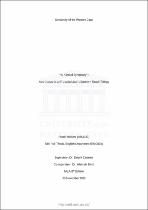| dc.description.abstract | The Anthropocene is the proposed name for a new geological epoch that has come about due to significant human changes to climate and environment. In response to the Anthropocene crisis, this thesis proposes a re-evaluation of the agency of non-human interlocuters – ultimately questioning the place of humans in the natural world. This viewpoint is explored through an examination of the New Weird, a literary genre that blends elements of transgressive horror and speculative fiction, often with an environmental lens. A close reading of Jeff VanderMeer’s Southern Reach trilogy reveals an attempt to challenge the conventional boundaries between human and non-human, which is predominantly achieved through an invocation of the ecological uncanny – a blurring of ontological, epistemological, and ethical boundary lines between humans and the environment. The Southern Reach novels present an environment where the fixed laws of nature proposed by reductive science begin to unravel. Therefore, VanderMeer – through elements of the genre of contemporary fantasy and science fiction known as the New Weird – casts doubt on the separation of humans and nature. The critique of the human/nature binary is something that is explored extensively by continental philosophers Gilles Deleuze and Félix Guattari, as well as feminist scholars like Stacy Alaimo, Rosi Braidotti, Donna J. Haraway, and Elizabeth A. Povinelli, who can all broadly be termed as ‘new materialist’ thinkers – owing to their insistence on cultivating new modes of thinking about human and non-human relations. It is through the combination of various new materialist theories and New Weird fiction that I am able to formulate an argument for a less anthropocentric reading of the Anthropocene; an interpretation that draws no distinction between nature and the human, and which allows for different forms of existence that exceed the human. | en_US |

